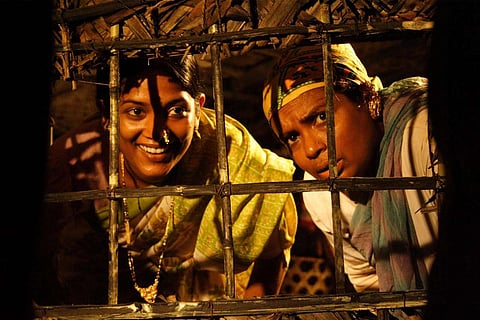

It’s been several months since theatres closed their doors in light of COVID-19, and it seems an understatement to say I miss the movies. Movies allow you to step away from reality, leave behind commitments, work and family, and mercifully put your phone away for a few hours. Admittedly, even if theatres were to open tomorrow, I would personally stay away until they were deemed safe again. But Girish Kasaravalli’s Gulabi Talkies quickly reminds you, in more ways than one, of the magic of movies.
Released in 2008, Gulabi Talkies received widespread acclaim for its writer-director as well as its lead actor Umashree, who plays the titular role of the film. Based on a short story by Kannada writer Vaidehi, the film, set in the late 1990s, revolves around a fishing village in Kundapura on the coast of Karnataka, where communal tensions, economic interests, friendship and a passion for the big and small screen take hold.
Gulabi (Umashree, who won a National Award for her role), is a Muslim woman and midwife of repute living in a predominantly Hindu fishing village. She boasts that she takes care of women and children across religions, castes and financial backgrounds. She lives alone in a shack along the shore, after her husband, a local fishing agent named Musa (KG Krishnamurthy), abandoned her to live with another woman and their small son nearby. Gulabi tries desperately to be a part of the child’s life, but she is shunned by the mother and her estranged husband.
But Gulabi has another love, one that can pull her away from the hardship she faces in her personal life. Everyone in the village knows it, too — Gulabi loves the movies. But while sitting in a dark movie theatre, watching the film unfold, her much-needed me-time is rudely interrupted by a trio of men. A woman from a rich family has gone into labour and they need her to come quickly. Gulabi is unceremoniously hauled out of the theatre and into a boat to the family’s home, much to her disgust. (“You shouldn’t go through labour during my movie time,” she later tells the young woman while delivering). Sour over the intrusion, she refuses to help. That is, until the family’s matriarch promises to bring the movies to her home.
A colour television and satellite dish soon arrive at Gulabi’s shack, and she becomes the talk of the village. Women line up to watch soap operas, action sequences and lovers performing song-and-dance numbers. Though some remain outside, refusing to enter Gulabi’s home because of her religion, but peeping through the window to get a glimpse of the screen, the television becomes a gathering place for the village. Gulabi sticks a Rajkumar poster outside her door and “Gulabi Talkies,” as an old neighbouring woman calls it, is born. The television isn’t just a chance to escape from the drudgery of life. Netru (MD Pallavi), a close friend to Gulabi who lives with her overbearing in-laws, watches in awe as feisty fictional women stand up to men and mothers-in-law in a way she can only dream.
But while one screen allows them to escape and unite, another pulls them, and the coastal villages, back into an ugly reality. In 1999, the Kargil War between India and Pakistan stoked political and communal unease across the country. And each night, scenes would unfold in the evening news, fuelling anti-Muslim anxieties thousands of kilometres away on the Karnataka coast. Musa, Gulabi’s estranged husband, is a successful fishing agent working under the helm of a never-seen businessman named Sulaiman, who is funding the operation from the Gulf. Accusations of cheating and treachery abound, as a smaller Hindu fisherman, Vasanna, finds that his business is depleting as Musa’s appears to be thriving. Tensions bubble over, and reach a height when Musa is beaten up by a group of men and ultimately runs away after apparently stealing lakhs of rupees from his employer. At the same time, Netru runs away from her home, leaving many to erroneously believe that the two have run away together.
Kasaravalli is known for highlighting women characters and the trials they face in his films. Quiet moments reflect the struggles of these women, like a fisherman's wife who is openly beaten by her husband as other women in the community merely laugh off her pain. Jolly, sweet-natured and fierce, Gulabi cannot imagine a scenario where her village, her friends, her neighbours would no longer want her. Yet without the presence of Musa, Gulabi must take the brunt of his seeming transgression. While she is being forced out of her home, she even reminds one of the men throwing away her vessels that she had been the midwife when he was delivered as a baby. “If it wasn’t for me, you wouldn’t have been here,” she says.
In the final, haunting few minutes of the film, Gulabi is sent away. When asked by a teen boy if she will return once things settle, she merely smiles, perhaps knowing that there is no path to escape this time. Later that night, two old women, who would not enter her home earlier, walk into the deserted shack and sit down in front of the television. They smile at the blank screen, perhaps unaware that for its charm, pleasure and pain to work, it has to be on.
Gulabi Talkies and other films by Girish Kasaravalli, are available to stream on Hotstar.